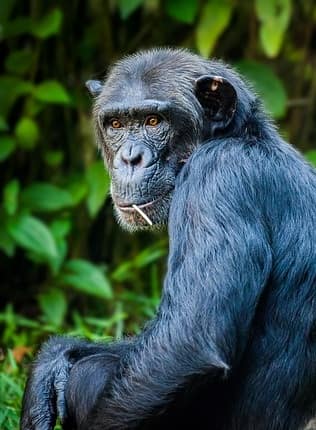| Back to Back Issues Page |
 |
|
Jane Goodall and her on-going work ED #126 April 02, 2019 |
Jane Goodall and her on-going workJane Goodall has left an extraordinary legacy of scientific discoveries. She’s established the place of women in research and convinced so many people of the need for protecting chimpanzees and their habitat.
From a Child who Loved Animals to an Activist Dedicated to Saving ThemVoice of America has a Simple English interview with her. You can listen to the audio version and check your understanding by reading the transcript.Jane tells about her childhood dream of going to Africa to see the animals there, and the very unlikely way that dream came true—because she wouldn’t give up, but kept watching for opportunities. She had the opportunity to meet the great anthropologist Louis Leakey. He realized she had the desire and determination necessary to do the research he needed on chimpanzees—and he also wouldn’t give up until he found a source of temporary funding for that research. In the middle of the interview, she tells about the discovery that changed everything for her—and changed scientists’ perception of what makes us human. She glimpsed a chimp she knew, David Greybeard, fishing for termites by putting a blade of dry grass into a termite mound. “I thought, ‘That’s tool-using.’ But it was so surprising because somebody had said to me, ‘If you see tool-using, the whole study is worthwhile.’ And the next day… I could see not only the whole of the use of the straw as a tool but breaking off a leafy twig, stripping off the leaves, which is the beginning of toolmaking… We were defined as man, the toolmaker… And so, it was after Louis Leakey got my telegram that he sent one back, saying, ‘We shall now have to redefine tool, redefine man, or accept chimpanzees as humans.’ Leaky arranged for her to study for a PhD at Cambridge (though she hadn’t been able to afford any college before.) The professors there criticized everything about her research (giving names and assigning feelings to the chimps as if they were human.) Then her supervisor went to Gombe to see for himself. “He realized very quickly that this way of thinking about nonhuman animals was — of the time, was very reductionist and didn’t explain complex behavior at all. And he really taught me how to write in such a way that I couldn’t be torn apart by all these erudite scientists.” Jane loved sharing her findings, but she planned to continue doing the research she loved most. Then she went to a conference on chimpanzees in the 1980s, and her life changed when she learned about the extent of environmental destruction and bushmeat hunting across Africa and the way chimps were being treated in labs and in zoos. “I came out as an activist, and since that day, I haven’t spent more than three weeks in any one place, except once… And since then, I’ve been traveling the world… trying to raise awareness about the situation we’ve plunged the planet into…” As she said next, it is making a difference, though not yet enough. Jane Goodall at Ted Global, 2007In her TED talk (which also has a written transcript available, as well as subtitles in 21 languages), she doesn’t discuss her life as much as she talks about chimpanzees—and the urgent need to protect the only planet we have.She explains her programs TACARE and Roots & Shoots. TACARE works to meet the needs of desperately poor villagers near Gombe. Roots & Shoots gives young people all over the world positive things they can do for their communities and the environment. Jane Goodall is doing all she can to create hope and a better future for people and for the creatures with whom we share the earth. Related Research: Local Communities Make the Best Forest GuardiansContrary to the expectations of many environmentalists, recent research shows native communities have done a much better job of preserving forests than their national governments.Environmental activists have worried about “the tragedy of the commons,” in which each individual will try to get a little more from jointly owned resources and not conserve them as they would their own property. These studies have concluded, as one researcher says, that “Strengthening community forest rights is critical to mitigating climate change.”
More Conservation VocabularyThe last issue’s crossword includes many words used this week as well.(Answers are here.)A few more: Behavior is the way people or animals normally act. (In the U.K. & some of the Commonwealth it’s spelled ‘behaviour.’) Chimpanzees are great apes similar to people in many ways. (Chimp is a shortened form.) Eventually means over a period of time. (Its opposite is ‘immediately.’) Termites are ant-like insects that chimps often eat. The next issue will look at some possible innovations for a green future. Warmly, Catherine Simonton, EnglishHints.com P.S. If you don’t like to open links in emails, you can go to the EnglishHinks Back Issues page and open them there. It’s https://www.englishhints.com/English_Detective-backissues.html A note if you get gmail: Have you missed any issues of English Detective? if you find English Detective in your Promotions box, you can move it to your Primary box (if you want) by clicking on it and dragging it there, then clicking Yes when asked if you want to always get it in the Primary box. If you are not already getting English Detective, you can subscribe by completing the form here. (It's free!) Also, you can reach me by mail at 1752 Driftwood Drive, El Centro, CA 92243, USA. |
| Back to Back Issues Page |
